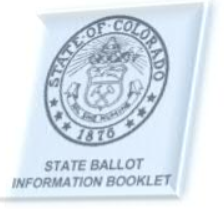by Cathy Eslinger
The Legislative Council Committee will meet tomorrow, Thursday, September 3, to review analyses of the measures that the secretary of state has certified to the 2020 general election ballot. This year’s ballot will include 11 measures, the majority of which—seven—are on the ballot because each received at least 124,632 signatures on initiative petitions. Of the remaining four, the General Assembly referred three of them to the ballot and the people referred one to the ballot by petition.
As required by the state constitution and by statute the Legislative Council Staff (LCS) has been working for weeks to prepare the analyses to help the public understand the purpose and effect of each measure. Following the Legislative Council’s review, the LCS will mail the analyses, printed in the familiar “blue book,” to each registered-voter household in the state.
The LCS prepares a blue book before each general election for which initiated or referred constitutional or statutory amendments or questions are certified to the ballot. The analysis of each measure includes a summary of the measure, the major arguments for and against  the measure, and a brief fiscal assessment of the measure. The analysis may also include other information that can help voters understand the measure’s purpose and effect. The goal is to write an analysis that is concise, readable for a layperson, and factually correct. In even‑numbered years, state law also requires that the blue book include information about the judges who are standing for retention in the coming election. The state commission and district commissions on judicial performance prepare this information and provide it to the LCS.
the measure, and a brief fiscal assessment of the measure. The analysis may also include other information that can help voters understand the measure’s purpose and effect. The goal is to write an analysis that is concise, readable for a layperson, and factually correct. In even‑numbered years, state law also requires that the blue book include information about the judges who are standing for retention in the coming election. The state commission and district commissions on judicial performance prepare this information and provide it to the LCS.
Each analysis typically goes through three drafts. But, depending on the complexity of the measure and the time available, some may require only two drafts. The LCS interviews proponents, opponents, and other stakeholders, using information provided by them, as well as information obtained through the LCS’s own research, to prepare and amend drafts.
The LCS maintains a stakeholder mailing list of individuals who express interest in receiving drafts and posts the draft analyses on a page on the General Assembly website along with the text of each measure. Any person may file written comments for staff to consider in preparing the drafts. The staff consider all comments and proposed amendments submitted by the established deadlines, but use discretion in changing the analysis. Some of the criteria for making proposed changes to the analysis include:
- Avoiding slogan-type language that triggers a response but does not contribute to greater understanding of the measure;
- Ensuring that statements are verifiable statements of fact rather than mere opinion, directly applicable to the measure, and not misleading;
- Ensuring that the language specifically strengthens or clarifies the arguments and is not repetitive;
- Maintaining the balance of the analysis between the opposing sides; and
- Avoiding language that is more appropriate for the campaigns conducted by the opposing sides.
As part of the analysis, the LCS also prepares a fiscal impact statement for each measure, taking into consideration fiscal impact information submitted by various state and local agencies, proponents and opponents, and other interested persons. The blue book will include a summary of each measure’s fiscal assessment, and the full fiscal impact statement for each measure will be available on the blue book website. At a minimum, the summary must include:
- An estimate of the measure’s effect on state and local government revenues, expenditures, taxes, and fiscal liabilities;
- An estimate of the amount of any state and local government recurring expenditures or fiscal liabilities; and
- For a measure that modifies the state tax laws, an estimate of the impact to the average taxpayer, if feasible.
The LCS submits a final draft of each analysis to the Legislative Council Committee, which holds a public hearing to review the analyses. Anyone who is interested in testifying on the accuracy or fairness of an analysis may do so at this public hearing. The Legislative Council may change the language of an analysis upon a two-thirds affirmative vote of the council members. Before the public hearing, the LCS will post on the General Assembly website information for each analysis that includes the final draft, any comments and amendments submitted to the last draft mailed to stakeholders, a list of persons who had opportunity to comment on the last draft, and the text of the measure.
Following the public hearing, the LCS mails copies of the blue book to each registered-voter household in the state no later than 30 days prior to the election. This year, the scheduled mailing date is Oct. 2. The LCS will also be mailing a Spanish language version of the book to each registered-voter household in counties identified by the U.S. Department of Justice under the federal Voting Rights Act. In 2020, these counties include Conejos, Costilla, Denver, and Saguache. Staff contracts with a professional translation service to prepare these materials.
In addition, when the blue book is ready for mailing, no later than September 10 this year, the LCS will post both the English and Spanish versions to the blue book page on the General Assembly website.
If you would like more detailed information concerning the process for preparing the blue book, check the General Assembly’s website.
